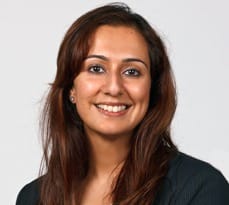Islamic finance is opening up to women. At present, the trend is most notable in Asian financial institutions – and particularly those of Malaysia, home to the world’s largest market in sukuk, or Islamic bonds1.
The success of high-profile female executives such as Baljeet Kaur Grewal, a Cambridge Judge Business School Executive MBA student, is evidence of this changing culture. Since 2008, she has been managing director and vice chairman of KFH Research, a wholly owned investment research subsidiary of Kuwait Finance House that is headquartered in Malaysia.
Under her stewardship, KFH Research has been much lauded by its peers in the burgeoning industry, winning 12 international awards for excellence in Islamic finance. Baljeet has also achieved personal recognition, receiving the Sheikh Rashid al-Makhtoum award in 2006 for her contribution to Islamic finance research and development in Asia.
Her preparation for a life in banking began at Hertfordshire University, where she graduated with a first-class degree in International Economics. More recently, she decided to pursue the 20-month Executive MBA programme at Cambridge Judge Business School – an experience she is finding invaluable in the continuing development of her career.
Since 2000, Malaysia has had a female governor of its central bank, Zeti Akhtar Aziz. Last year, there were around 10 female sharia advisers operating in Malaysia, and the country’s Sharia Advisory Council appointed the second woman to its 11-member board2. Other Asian countries are following suit – Indonesia has had as many as 6 women on the 35-strong expert panel of its National Sharia Council3.
Female participation in Islamic finance within Gulf states is lagging behind that of Asia; but there are several reasons why this may change. With the industry growing by around 20% each year4, it is estimated that around 50,000 professionals will need to be recruited globally over the next 6 years or so5.
In the past, cultural conservatism in the Arabian Gulf has militated against women taking leadership positions; but societal norms are changing. The number of Saudi women working in the banking sector rose almost fourfold from 2000-2008 (albeit almost entirely in women-only bank branches).
A driving force in ensuring greater female participation6 in Malaysia is the need to recruit a larger number of Islamic scholars to advise on Sharia compliance. A shortage of suitably qualified people is causing conflicts of interest, with many advisors forced to sit on multiple panels, a practice prohibited in Malaysia.
If the idea of female Sharia advisers and finance executives gains acceptance in Gulf Cooperation Council states, there is already a large pool of educated women from which they could be recruited and trained. In Saudi Arabia, for example, 93% of women hold a secondary-school certificate or university degree7.
It is arguable, too, that the cultural factors that impede the progress of women into executive roles are often overstated by Western media: several Muslim countries that have well-developed markets in Islamic finance, including Bangladesh, Indonesia, Turkey and Pakistan, have had female heads of government.
Sources: 1Reuters; 2Bloomberg; 3Bloomberg; 4Islamic Financial Services Board; 5La Trobe University, Melbourne; 6Reuters; 7Al Masah Capital; 8Booz & Co Ideation Centre.


